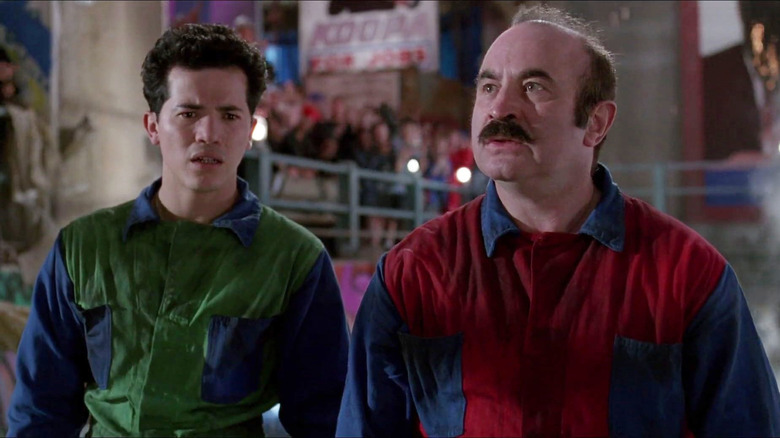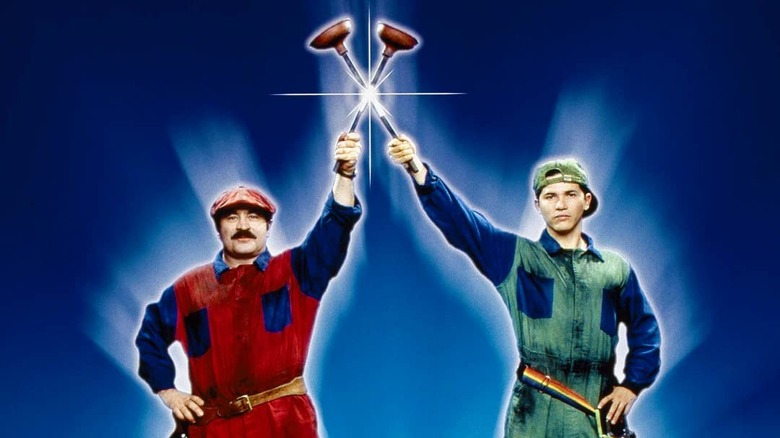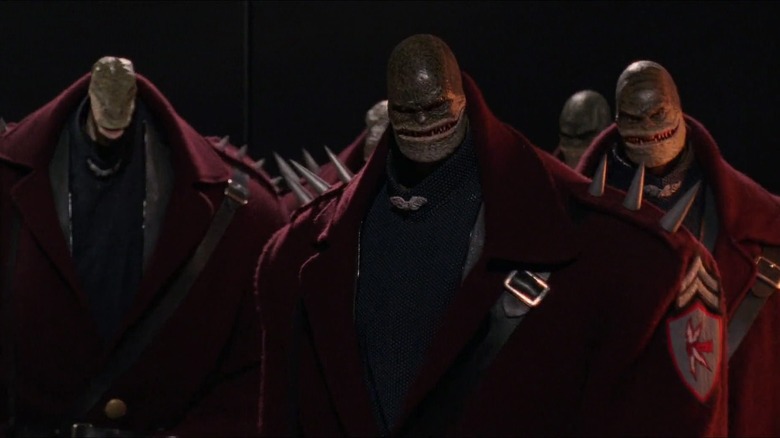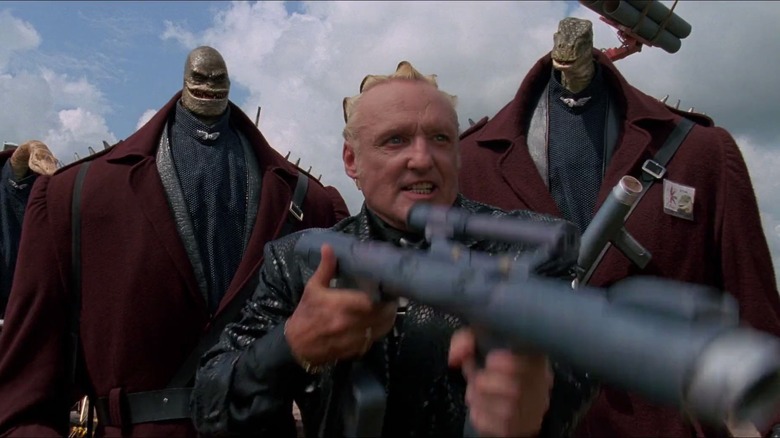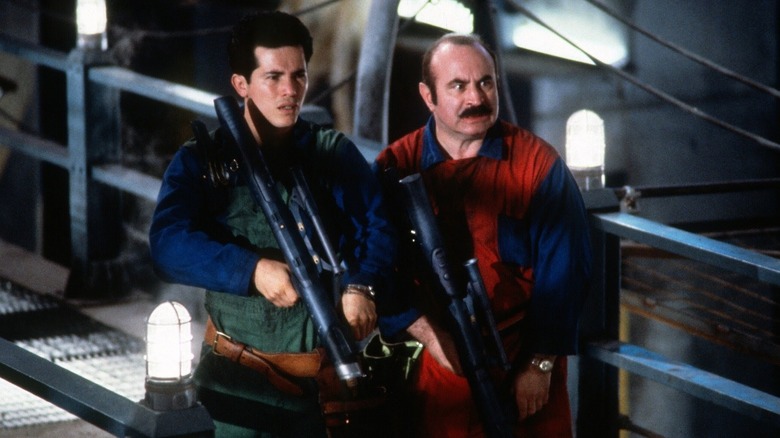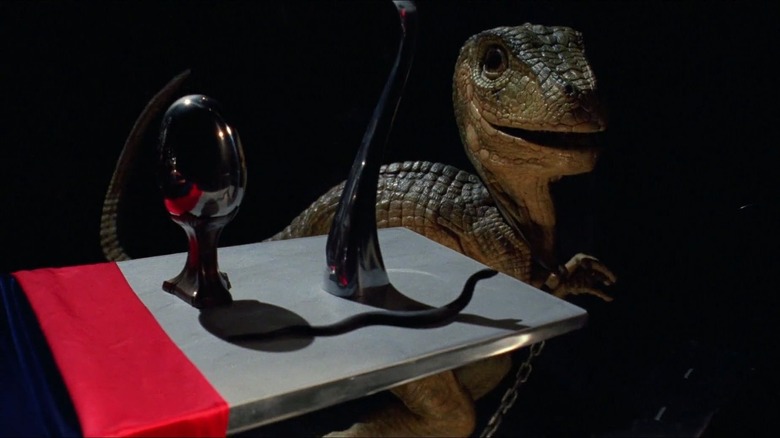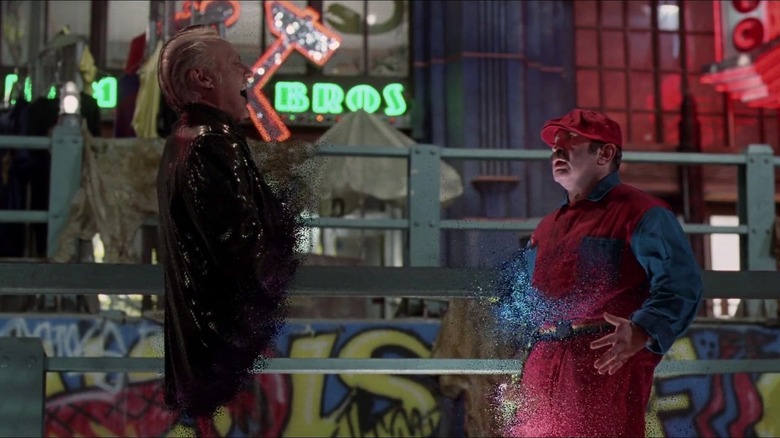Tales From The Box Office: The Disastrous Super Mario Bros. Set The Tone For Video Game Movies For Years To Come
(Welcome to Tales from the Box Office, our column that examines box office miracles, disasters, and everything in between, as well as what we can learn from them.)
It was true in the early '90s and it remains true now: Mario is the king of video games. To this day, there's arguably no mascot more recognizable for an industry worth billions and, by the end of the '80s, Hollywood was starting to realize this whole video game thing was here to stay. Naturally, that meant capitalizing on the popularity with a major motion picture. It also meant that Nintendo's "Super Mario Bros." was the white whale of IP that any studio could hope to get their hands on. In 1993, the result of producer Roland Joffe's unlikely bid to win those rights hit theaters and set the tone for video game movies for years to come — and not in a good way.
Joffe, the director of Oscar-nominated films like "The Killing Fields," had been wooing Nintendo (along with everyone else in Hollywood) for the rights to the popular characters. Despite having far less money and less clout than the competition, Joffe's Lightmotive production company managed to beat the competition and, in 1990, paid $2 million for the privilege of bringing Mario and Luigi to life. What followed was one of the most infamously disastrous productions ever.
Today, in honor of Illumination's "The Super Mario Bros. Movie" hitting theaters, we're looking back at the original live-action adaptation, how a pair of untested directors ended up at the head of a sinking ship, the nightmare scenario that unfolded once the film hit theaters, and what lessons we can learn from it 30 years removed. Let's dig in, shall we?
The movie: Super Mario Bros.
Roland Joffe's original pitch to Nintendo didn't include too much (or so the legend goes), only that he wasn't going to make a movie strictly for kids, with the idea being that they wanted to make something adults could enjoy as well. Script-writing duties fell to Oscar-winner Barry Morrow ("Rain Man") who, by all accounts, turned in a great script — one capable of getting A-list talent such as Bob Hoskins and Dennis Hopper to sign on for major roles as Mario and King Koopa, respectively.
Unfortunately, Morrow's original script would never make it to the screen, as the film's producers insisted on having it rewritten over, and over again, all throughout production. According to Game Informer's 25th-anniversary retrospective (which has since been pulled from the internet following the shuttering of Game Informer Magazine after this article's publication), "Super Mario Bros." was touched by at least nine writers, including Ed Solomon ("Bill and Ted's Excellent Adventure") in the 11th hour.
The film we ended up with centers on Brooklyn plumbers Mario (Hoskins) and Luigi (John Leguizamo), who discover a parallel world full of the descendants of dinosaurs who were hurled into another dimension by a giant meteor 65 million years ago, rather than being destroyed. The brothers must battle the evil King Koopa and his Goombas, free Princess Daisy (Samantha Mathis), and save humanity.
It sounds a little bizarre (because it is) and yes, it diverted from the games quite a bit. Hoskins, for his part, would later call it "the worst thing I ever did." Speaking with The Guardian in 2007, the actor did not mince words:
"It was a f***in' nightmare. The whole experience was a nightmare. It had a husband-and-wife team directing, whose arrogance had been mistaken for talent. After so many weeks, their own agent told them to get off the set! F***in' nightmare. F****in' idiots."
Rocky and Annabel, the Flying Squirrel Show
Annabel Jankel and Rocky Morton ("The Max Headroom Show") only had one feature credit to their name ("D.O.A.") when they took on "Super Mario Bros." With big-name directors such as Ivan Reitman ("Ghostbusters") having happily passed on the project, however, it was ultimately decided that some fresh blood was the way to go. "I remember saying to Annabel, 'This is it. This is going to be our 'Batman,”" Morton recently told Total Film. It would not become their "Batman."
That Total Film profile paints a picture of Jankel and Morton being dealt a bad situation by a meddling studio that refused to honor their original vision, leaving them scrambling the whole way and, eventually, holding the bag. Sets constructed by art director David Snyder ("Blade Runner") didn't match the script coming in. A scene from the end of Barry Morrow's script draft, explaining that this was to be Mario and Luigi's origin story, which would, in turn, inspire the video games, was gone.
"When the new script came in, the storyboards I'd made just didn't make any sense. I wheeled them all into the parking lot and set fire to them because I didn't want anybody seeing them and getting confused,' Morton explained in that same profile. Sympathetic as one can be 30 years later, it's worth pointing out that seemingly all of the cast and crew who worked on the film didn't have very nice things to say about Jankel and Morton, with the duo earning several nicknames during production like "Rocky and Annabel, the Flying Squirrel Show."
"It was a tremendous relief to have gotten through the shoot," Jankel explained. "We fulfilled our obligations, but when we left, we were utterly exhausted and decimated. It started off as brilliant and ended up a very miserable experience." Unfortunately for them, the misery was only just beginning.
The cast speaks out
Production on the $40 million budgeted blockbuster (a massive sum at the time) did not go well by seemingly anyone's account. There are numerous profiles of the filmmakers, anniversary pieces, and op-eds to go around regarding this film, and none of them paint a kind picture of a shoot that was supposed to last 10 weeks but dragged on for 15. Apparently, Annabel Jankel and Rocky Morton weren't allowed to speak to the various writers during production, which only further complicated matters on their end. Be that as it may, they took the brunt of the blame in the press.
After the grueling shoot wrapped, the directors headed to Los Angeles to begin a tough post-production process. Unfortunately, they arrived to find a huge cover story in the Los Angeles Times, with the outlet speaking to various cast members who all painted a less-than-great picture of the duo. The filmmakers themselves weren't interviewed for the piece, which only made matters worse.
"The directors won't give interviews?" Dennis Hopper said in the 1992 piece. "That's the smartest thing I've heard from them. That's the only intelligent thing I've heard that they've really actually done." Yikes. John Leguizamo, who was beginning to break out in his career, was also having a rough go of it. "Every day's a new page. It's like waiting for the news. What the hell happened yesterday? And there it is: All new, all live. 24 hours: Ding, ding, ding," he said. Hopper eventually resigned himself to learning his lines on the day:
"The script had probably been rewritten five or six times by the time I arrived here. I don't really bother with it anymore. I just go in and do it scene by scene. I figure it's not going to hurt my character."
A video game with no story
Perhaps one of the most telling quotes in the piece came from co-producer Fred Caruso ("The Godfather"), who attempted to defend all of the meddling with the script that had its stars all pissed off. In fairness to the cast, the script that convinced them to sign on had since been abandoned entirely. But Caruso tried to write it off as just part of the process:
"It's not unusual to go through many script changes, and especially with this particular film because this comes from a video game that has no story. Everything we're doing is made up and it comes from the flow of what we're shooting. All the games have are the characters."
In the year 2023, video games are mainstream and video game adaptations are common. "The Last of Us" is one of the biggest shows on TV and "Sonic the Hedgehog" is one of the more successful franchises to launch in the last handful of years. In the early '90s? This was brand new territory, and that quote speaks to just how little Hollywood understood how to treat these things.
We can also learn a lot from the other big-name talents who passed on the project, with Danny DeVito passing on the chance to both direct and play Mario, while both Arnold Schwarzenegger and Michael Keaton passed on King Koopa. Amazingly enough, even Tom Hanks briefly signed on to play Mario at one point. Some executives thought Hanks was asking for too much money, so it fell to Bob Hoskins. In almost no time, Hanks was the biggest movie star in the world. Hanks or no Hanks, there was no saving Hollywood's first big video game movie from a date with disaster.
The financial journey
By the time "Super Mario Bros." hit theaters on May 28, 1993, a ton of investors had money riding on the production, with several companies scooping up international distribution rights, while Disney swooped in to grab the domestic rights. This would prove to be a poor decision on the Mouse House's part, as the film earned terrible reviews from critics, riding a wave of negative buzz on its way to multiplexes that summer.
The film debuted over Memorial Day weekend to a dismal $8.5 million stateside, coming in fourth place and losing out to Sylvester Stallone's "Cliffhanger." Things only got worse in the weeks that followed, as "Jurassic Park" arrived on June 11, going on to become one of the biggest movies in history up to that point. Other movies such as "Last Action Hero" and "Sleepless in Seattle" (which starred Tom Hanks) would take even more attention away in the ensuing weeks. The Nintendo adaptation fell off a cliff.
Ultimately, the movie tapped out with just $20.9 million domestic. While international figures are a little hard to come by, it's said to have pulled in just shy of $18 million overseas for a grand total of $39 million (give or take $100,000). For a movie that cost at least $40 million to produce — before marketing — based on a video game that was beloved by millions and recognized the world over, this was a worst-case-scenario.
In the years that followed, films like "Street Fighter," "Mortal Kombat," "Lara Croft: Tomb Raider," "House of the Dead," "Doom," and many others would try to crack the code while bringing a video game property to the big screen. Franchises like "Resident Evil" found financial success, but strongly lacked critical backing. It would be decades before the tide finally turned.
The lessons contained within
It wasn't really until "Rampage" hit theaters in 2018 that studios started to settle on a well-rounded formula for making video game movies work, with "Detective Pikachu" and "Sonic the Hedgehog" making further progress. Nowadays, the future's looking brighter than ever; even "The Super Mario Bros. Movie" is poised to make an absolute killing at the box office, unlike its live-action predecessor. That being said, Rocky Morton has found solace in knowing that generational nostalgia has caught up with his and Annabel Jankel's odd misfire. In that recent Total Film profile, Morton explained:
"Every person I've met who saw it as a kid absolutely loves it. It's one of their favorite movies. As I've got older, I've let go of my feelings towards it. I find it quite funny and ironic that it's being appreciated now, not just for the mess that it is but because in that mess there are jewels — and young creative minds can see those jewels."
For whatever nostalgia people have for the film, it's clear that studios and filmmakers not respecting the source material hurt video game adaptations for years. Taking something interactive and making it a passive experience while maintaining what's special about it is difficult, though not impossible by any means. But respecting the material is key and, at long last, we're starting to see a world where this material is indeed respected.
Unfortunately, it took a long time to get here and "Super Mario Bros." laid out a rocky road that others followed for far too long. But now that we are in a better place and finally have some good examples to follow, the powers that be would do well to heed those lessons, lest they go down in history for the wrong reasons like this movie did.
